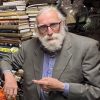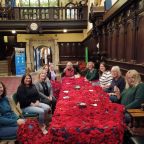
Braxton Reynolds former public analyst for Exeter and Devon who opened a sex shop has died
When Truro Magistrates’ court was told by the defendant in a sex shop licensing hearing that he would be unable to make revised court dates because he would be giving evidence as an expert witness in two different trials, the judge was sceptical. A letter was duly sent to the Office for Judicial Complaints along with a three-page CV outlining Braxton Reynolds’s expertise as a consulting chemist, past president of the Association of Public Analysts (APA), and former public and agricultural analyst for the Counties of Devon and Cornwall, as well as many other positions of public standing, not normally associated with the world of erotica. It came as no surprise to those who knew the litigant, that the judge never sat on future hearings involving Mrs Palm Limited, the risquély named marital aides emporium which had opened to much furore in the Cornish city nearly three years earlier.
In many ways ownership of Mrs Palm, perfectly demonstrated the contradiction that was Brax, as he was fondly called by friends. For while on the one hand he was a highly-regarded applied scientist, a fierce defender of public analyst service in the face of cost-cutting measures, one who was regularly called upon to offer expert evidence in both court and parliamentary committees and attend European conferences on matters of additives in foods and consumer goods; on the other he was a mischief-maker who enjoyed nothing more than tweaking the noses of those he regarded as pompous. Though it must be said that in opening Truro’s first sex shop in semi-retirement he took his unconventional outlook to a new level upsetting Methodists, moral campaigners, city and county councillors, local shopkeepers, as well as the Cornish bench. But convention was never Reynolds’s style, he was a man who revelled in being an outsider and who enjoyed nothing more than cultivating his eccentricities, which grew as he aged. However, much of this may have been to mask his sadness that he never had a family of his own. Indeed, shortly before his death he lamented: “My greatest disappointment was that I never did my duty to pass on my parents’ genes to the next generation.”
Edward Braxton Reynolds BSc (Hons) Chemistry, MChemA, CChem, MRSC, was born in Exeter, Devon, in 1940, the only son of Phyllis and her husband Dr Cedric Victor Reynolds BSc, PhD, FRIC, a partner in Tickle and Reynolds the public analysts for Exeter and Devon. His parents first met at Exeter public laboratory in 1928, where Phyllis Mary Johnson had been working as a secretary for five years, she left her job when they married in 1933. Dr Reynolds was not called up to serve during the Second World War, as his position was a reserved occupation. When he was a little over a year old, Phyllis contracted Diphtheria and spent almost a year on an isolation ward. Her infant boy was sent to his maternal grandmother to be looked after. The experience was so traumatic that it left him with deep mental scars that stayed with him for the rest of his life. He later explained that after that time he found intimacy difficult and he did not like to be touched, a condition which meant that relationships in adulthood quickly withered on the vine.
He was educated at Rosary House School in Heavitree before attending the preparatory school and then Exeter School, where he was one of the shooting eight. He read Chemistry at University College in London where his father had studied more than three decades earlier, winning two gold medals in his final year. By his own admission, Reynolds junior was not the best of students achieving “a very undistinguished degree” having been left unenthused by the lecturers who “wanted the chemistry to be pure and not applied”. Despite this he soon found a junior position with Messrs Moir and Palgrave, a laboratory based in Southwark Street, London. Donald Moir, had been one of Thomas Tickle’s assistants in the early thirties. The appointment gave him a grounding in the application of chemical analysis in a public analyst laboratory, and three years later Reynolds returned to Exeter to work alongside his father. It was during this time that he was studying for his Mastership in Chemical Analysis (MChemA), which he sat in 1973. Unusually, he passed at first presentation, and qualified as a public analyst was immediately appointed public analyst, official agricultural analyst and scientific advisor for Devon and later in the same year for Cornwall and the Isles of Scilly. His father immediately stepped down as senior partner and became his son’s deputy.
Soon afterwards he was called upon by the Ice Cream Manufacturers Association to test 30 products for a competition to find the best dairy ice cream for its annual conference - to ensure that the only fat in them was milk fat. He turned the task around in a morning, surprising colleagues who thought it should take at least a full day. Speed, or rather efficiency, was the watchword for Reynolds. When asked - in conjunction with other laboratories - to test for the presence of a recently banned artificial sweetener in soft drinks he devised a method to detect if it was present, by smell alone.
When asked - in conjunction with other laboratories - to see how much of a recently banned artificial sweetener was in soft drinks he devised a test for the presence , by smell alone. This allowed him to drastically reduce the number of samples to test. He explained: “Laboratories in other parts of the country devised extremely elaborated quantitive measurement procedures to identify the amount of this additive, if present, in the soft drinks. I decided that we didn’t want to know how much was there, if it was nothing. The thing is, as Mr Tickle used to say, when you see a brick wall, don’t look at the bricks and mortar, understand why it is there. So, the job of a public analyst is to protect consumers if there are additives present that are a risk to life and health, you test for its presence, if it isn’t there, you don’t waste time, determining how much of it isn’t there.”
As a member of the APA, he attended British Standards Institution (BSI) meetings on issues of foods, food additives, food packaging, also toys and consumer durables and that meant attending committees of The Food and Agriculture Organisation/World Health Organisation (FAO/WHO) responsible for setting international standards, including the Codex Committee for Methods of Analysis and Sampling, helping to speed up the importation and exportation of perishable foods. He also led on sweeteners in food, because of concerns about the additives widely used outside of Europe.
Sometime in the early 1990s, he received a call from the Ministry of Agriculture, Fisheries and Food (MAFF) asking if his laboratory carried out species identification on the meat and bonemeal used in animal feed. No, he said, and asked what species they were hoping to identify: human, came the reply. The official explained that many Muslims had gone missing and feared killed as part of the ethnic cleansing being carried out by Serbian forces during the ongoing Bosnian War. Officials suspected the dead were being reduced to animal feed as a way of getting rid of them. Thankfully, none was found.
In 1998 he was elected APA President, during which time he gave evidence to the House of Commons Committee on Food Standards. Reynolds appeared less bothered about answering the members’ enquiries than ensuring that they asked the right ones, helpfully supplying 66 questions that he thought the committee should be asking. He believed that this act so infuriated officials at MAFF, that they blocked an appointment for him to chair a working party on chemicals and pharmaceuticals present in meat, a few months later. It was during these meetings he said that he realised how much science was respected abroad and not in the UK, he complained: “This country in my experience had been badly administered, badly led, and, as a result, disadvantaged.” He also found himself fighting the then Labour Government’s plans to bring in Best Value policy which was being introduced to replace Compulsory Competitive Tendering, the result of which drove down prices - and in Reynolds’s opinion saw standards dropping - ultimately leaving him unable to compete in this newly created marketplace.
In 2010, at the age of 69, Reynolds embarked on a new venture, by opening Cornwall’s only sex shop with business partner Nicola Hewitt in a small parade of shops in Truro city centre. Among his most prominent of opponents was local councillor Armorel Carlyon, and the Christian Institute. Acting as his own counsel, Reynolds deployed years of courtroom experience as an expert witness dealing with difficult barristers to make his case. His arguments were wide-ranging from the Local Government (Miscellaneous Provisions) Act 1982, Mary Whitehouse and the permissive society, and Gilbert and Sullivan among other topics. The vote was unanimous in his favour. Being granted the licence was, however, only half the battle. Protracted efforts by the Christian Institute (which at one stage hired a private detective in an attempt to get them to trade outside of its licensed hours) to get the shop closed down, resulted in years of legal battles, in which Reynolds defending himself through the courts and won every legal argument. The Institute also took legal action against Cornwall Council to force them to reverse the decision. The case was heard by Mr Justice Hickinbottom who not only sided with the council and shop but awarded Reynolds his costs. Council officers also demanded that the shop should have CCTV both inside and outside recording customers’ shopping, Reynolds again took issue arguing it flew in the face of his customers’ privacy. Having won the argument, the local authority then applied for costs against the shop. When asked by the stipendiary magistrate if he had any response, Reynolds pointed to the district judge’s own judgment which included the line that the council had been “unreasonable”, the magistrate refused costs on those grounds. Shortly afterwards Reynolds had cause to ring Cornwall Council’s senior solicitor, Mark Andrews, who had just returned from a six-week secondment on the Falkland Islands. Andrews enquired if he was planning to make any more appeals telling him: “Because if you are, I’m going back to the Falklands forever.”
In the mid-1980s he became a member of the Savage Club, in London, attending many of its dinners. In his spare time he was an avid collector, filling his Exeter city centre home with almost an equal amount of trash and treasure. For more than 40 years he was a regular at Exeter’s Sunday morning market, as well as auction houses around the city, and on eBay. He left a collection of 120,000 books, analytical records of private water sources in Devon and Cornwall dating from 1900 to the present day, and many projects half-completed or waiting to be started, among much else. He leaves his beloved Jack Russell, Claude.
Edward Braxton Reynolds, consulting chemist, was born December 20, 1940. He died from complications from mesothelioma on May 31, 2023, aged 82. His funeral takes place at 10.30am Heavitree Parish Church, Exeter, on Friday, June 30.














